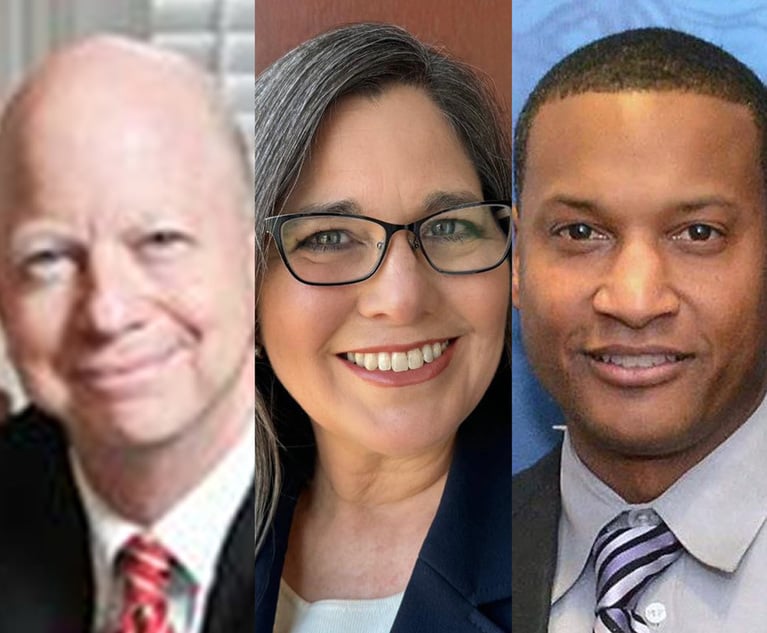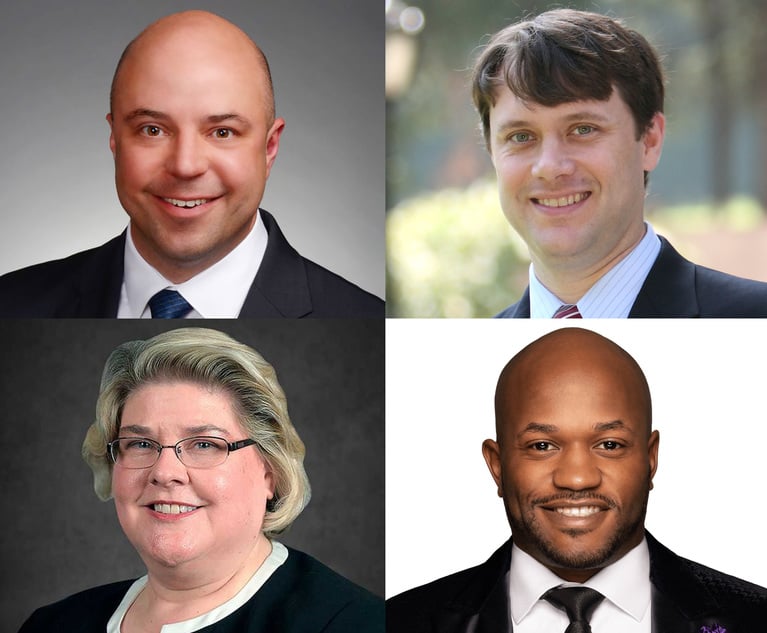 Dean Peter "Bo" Rutledge (from left), Katherine Marie Larsen and Miles Porter, University of Georgia, Athens. (Courtesy photos)
Dean Peter "Bo" Rutledge (from left), Katherine Marie Larsen and Miles Porter, University of Georgia, Athens. (Courtesy photos)Lawyers Should Keep Their Eyes on Cuba Sanctions Cases
The federal cases are still pending, but the upcoming decisions should provide useful insight into how U.S. courts will respond to the novel Helms-Burton claims.
November 26, 2019 at 10:06 AM
5 minute read
A dramatic change in the executive branch position on Cuban sanctions recently led to a wave of litigation in the federal courts and could have broad implications for entities that conduct business in or with Cuba. In April, Secretary of State Mike Pompeo announced that Title III of the Helms-Burton Act would no longer be suspended, thereby allowing U.S. nationals to file lawsuits against any individual or entity that "traffics" in property expropriated by the Cuban government.
The Cuban Liberty and Democratic Solidarity (LIBERTAD) Act of 1996, also known as the Helms-Burton Act, bolstered the robust U.S. sanctions on Cuba. It sought to discourage foreign investment by prohibiting the indirect financing of transactions involving property confiscated from U.S. nationals. One of the main purposes of the act is to "protect United States nationals against confiscatory takings and the wrongful trafficking in property confiscated by the Castro regime." Title III of the Helms-Burton Act establishes a private right of action for U.S. nationals against entities trafficking in property expropriated by the Cuban government since 1959. Title III defines "trafficking" broadly, imposing liability on individuals or businesses who "knowingly and intentionally" sell, transfer, dispose of or engage "in commercial activity, without the authorization of a U.S. national with a claim to the property." In addition, Helms-Burton authorizes the president to suspend the right to file a lawsuit for successive six-month periods, thereby foreclosing U.S. nationals' ability to seek damages for expropriated property. Until Pompeo's April announcement, Title III had been suspended by successive administrations and had lain dormant.
The international reaction to the suspension of Title III has largely been negative. The decision by the Trump administration has been condemned by significant U.S. trading partners, including the European Union, Japan, the United Kingdom and Canada. The EU has issued a statement expressing strong opposition to the lifting of the suspension, claiming the measure is contrary to international law, and they will consider all options to protect its legitimate interests.
On May 2, the first lawsuit was filed under the Helms-Burton Act. Javier Garcia-Bengochea brought an action under Helms-Burton as the rightful owner of an 82.5% interest in commercial waterfront real property in the Port of Santiago de Cuba. Garcia-Bengochea alleges that, in 1960, the Cuban government nationalized and expropriated said waterfront property without compensation. Garcia-Bengochea's ownership consisted in part of a claim certified by the Foreign Claims Settlement Commission, as well as an uncertified claim in part. Garcia-Bengochea alleges that defendant Carnival Corp.'s actions constituted "trafficking" when Carnival knowingly and intentionally commenced and promoted its commercial cruise line business to Cuba, in which Carnival regularly embarks and disembarks its passengers using the commercial waterfront real property. Carnival Corp. filed a motion to dismiss, alleging that Garcia-Bengochea's claim was barred by Title III's "lawful travel" exception, that Garcia-Bengochea failed to prove a rightful ownership claim to the property and that the alleged property is not the property Carnival is allegedly trafficking in.
The District Court for the Southern District of Florida, denied Carnival's motion to dismiss, held, that based on the text, context, and purpose of Helms-Burton, Garcia-Bengochea's complaint adequately alleged ownership of the property in question. The court reasoned that Congress would have understood the term "claim" to confiscated property to encompass both direct and indirect interests, as a more limited reading would significantly undermine the Congressional goal of deterring trafficking. The court's decision indicated that as long as a plaintiff is able to show some type of beneficial ownership, the claim would be presumed valid. In addition, the court made clear that the lawful travel exception provided by Title III was an affirmative defense that would need to be established by the defendant, not negated by the plaintiff. Although it is still early in the litigation, the court's decision may be promising to plaintiffs in stating the claims and may be encouraging to others to file causes of action.
With more questions than answers at this point regarding the scope of liability for entities conducting business in or with Cuba, the bar should watch carefully for the outcome of upcoming federal cases pending in the Southern District of Florida. Due to the broad definition of "trafficking" and treble damages, it is likely that most claimants will seek to hold liable entities that directly or indirectly profit from "trafficking." The federal cases are still pending, but the upcoming decisions should provide useful insight into how US courts will respond to the novel Helms-Burton claims. In the meantime, entities doing business in Cuba should heed the litigation risk and consult counsel before embarking on a transaction that could trigger Title III.
One sentence of the initial version of this article mistakenly said the EU had issued a statement expressing strong opposition to the suspension. The article has been corrected to say the EU has issued a statement expressing strong opposition to the lifting of the suspension.
Peter B. "Bo" Rutledge is dean of the University of Georgia School of Law, where he holds the Herman Talmadge Chair of Law. A former clerk to U.S. Supreme Court Justice Clarence Thomas, Rutledge pursues teaching and research of international dispute resolution, arbitration, international business transactions and the U.S. Supreme Court. Rutledge advised a firm in a Helms-Burton case, though not the one addressed herein.
Katherine M. Larsen is a third-year law student at the University of Georgia School of Law and a recipient of the Talmadge Law Scholarship and the Law School Association Merit Scholarship.
Miles S. Porter is a second-year law student at the University of Georgia School of Law and a recipient of the Talmadge Law Scholarship and the Veterans Scholarship.
This content has been archived. It is available through our partners, LexisNexis® and Bloomberg Law.
To view this content, please continue to their sites.
Not a Lexis Subscriber?
Subscribe Now
Not a Bloomberg Law Subscriber?
Subscribe Now
NOT FOR REPRINT
© 2024 ALM Global, LLC, All Rights Reserved. Request academic re-use from www.copyright.com. All other uses, submit a request to [email protected]. For more information visit Asset & Logo Licensing.
You Might Like
View All

Who Got the Work: 16 Lawyers Appointed to BioLab Class Action Litigation
4 minute read

'Possible Harm'?: Winston & Strawn Will Appeal Unfavorable Ruling in NASCAR Antitrust Lawsuit
3 minute readTrending Stories
- 1Legal Events for Georgia Lawyers
- 2'There is No Time to Waste': Matt Gaetz Withdraws From AG Nomination
- 3The Growing PFAS Morass: Why Insurance Should Cover These Products Liability Claims
- 4Dallas Jury Awards $98.65M in Botham Jean Killing by Dallas Officer
- 5In Talc Bankruptcy, Andy Birchfield Skipped His Deposition. Could He Face Sanctions?
Who Got The Work
Michael G. Bongiorno, Andrew Scott Dulberg and Elizabeth E. Driscoll from Wilmer Cutler Pickering Hale and Dorr have stepped in to represent Symbotic Inc., an A.I.-enabled technology platform that focuses on increasing supply chain efficiency, and other defendants in a pending shareholder derivative lawsuit. The case, filed Oct. 2 in Massachusetts District Court by the Brown Law Firm on behalf of Stephen Austen, accuses certain officers and directors of misleading investors in regard to Symbotic's potential for margin growth by failing to disclose that the company was not equipped to timely deploy its systems or manage expenses through project delays. The case, assigned to U.S. District Judge Nathaniel M. Gorton, is 1:24-cv-12522, Austen v. Cohen et al.
Who Got The Work
Edmund Polubinski and Marie Killmond of Davis Polk & Wardwell have entered appearances for data platform software development company MongoDB and other defendants in a pending shareholder derivative lawsuit. The action, filed Oct. 7 in New York Southern District Court by the Brown Law Firm, accuses the company's directors and/or officers of falsely expressing confidence in the company’s restructuring of its sales incentive plan and downplaying the severity of decreases in its upfront commitments. The case is 1:24-cv-07594, Roy v. Ittycheria et al.
Who Got The Work
Amy O. Bruchs and Kurt F. Ellison of Michael Best & Friedrich have entered appearances for Epic Systems Corp. in a pending employment discrimination lawsuit. The suit was filed Sept. 7 in Wisconsin Western District Court by Levine Eisberner LLC and Siri & Glimstad on behalf of a project manager who claims that he was wrongfully terminated after applying for a religious exemption to the defendant's COVID-19 vaccine mandate. The case, assigned to U.S. Magistrate Judge Anita Marie Boor, is 3:24-cv-00630, Secker, Nathan v. Epic Systems Corporation.
Who Got The Work
David X. Sullivan, Thomas J. Finn and Gregory A. Hall from McCarter & English have entered appearances for Sunrun Installation Services in a pending civil rights lawsuit. The complaint was filed Sept. 4 in Connecticut District Court by attorney Robert M. Berke on behalf of former employee George Edward Steins, who was arrested and charged with employing an unregistered home improvement salesperson. The complaint alleges that had Sunrun informed the Connecticut Department of Consumer Protection that the plaintiff's employment had ended in 2017 and that he no longer held Sunrun's home improvement contractor license, he would not have been hit with charges, which were dismissed in May 2024. The case, assigned to U.S. District Judge Jeffrey A. Meyer, is 3:24-cv-01423, Steins v. Sunrun, Inc. et al.
Who Got The Work
Greenberg Traurig shareholder Joshua L. Raskin has entered an appearance for boohoo.com UK Ltd. in a pending patent infringement lawsuit. The suit, filed Sept. 3 in Texas Eastern District Court by Rozier Hardt McDonough on behalf of Alto Dynamics, asserts five patents related to an online shopping platform. The case, assigned to U.S. District Judge Rodney Gilstrap, is 2:24-cv-00719, Alto Dynamics, LLC v. boohoo.com UK Limited.
Featured Firms
Law Offices of Gary Martin Hays & Associates, P.C.
(470) 294-1674
Law Offices of Mark E. Salomone
(857) 444-6468
Smith & Hassler
(713) 739-1250






